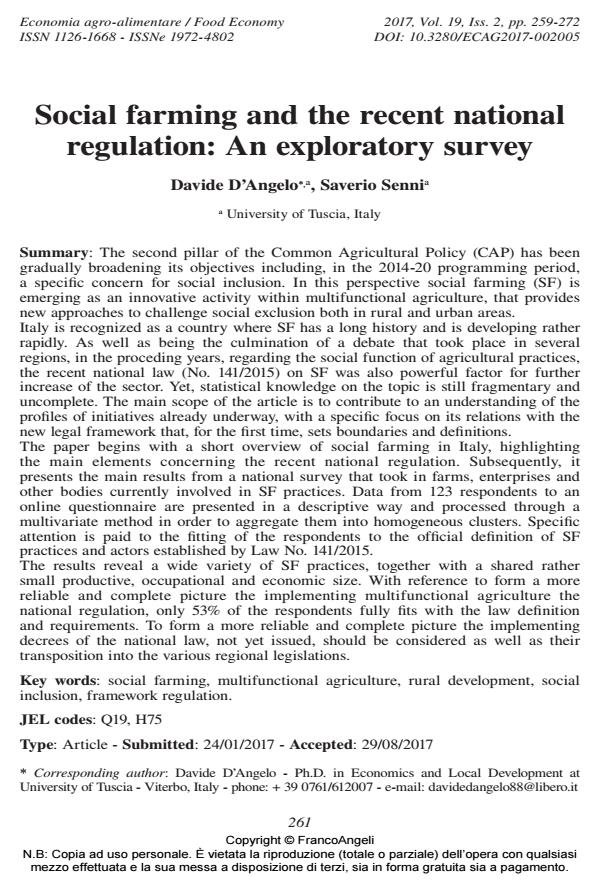Social farming and the recent national regulation: An exploratory survey
Titolo Rivista ECONOMIA AGRO-ALIMENTARE
Autori/Curatori Davide D’Angelo, Saverio Senni
Anno di pubblicazione 2017 Fascicolo 2017/2
Lingua Inglese Numero pagine 14 P. 261-274 Dimensione file 117 KB
DOI 10.3280/ECAG2017-002005
Il DOI è il codice a barre della proprietà intellettuale: per saperne di più
clicca qui
Qui sotto puoi vedere in anteprima la prima pagina di questo articolo.
Se questo articolo ti interessa, lo puoi acquistare (e scaricare in formato pdf) seguendo le facili indicazioni per acquistare il download credit. Acquista Download Credits per scaricare questo Articolo in formato PDF

FrancoAngeli è membro della Publishers International Linking Association, Inc (PILA), associazione indipendente e non profit per facilitare (attraverso i servizi tecnologici implementati da CrossRef.org) l’accesso degli studiosi ai contenuti digitali nelle pubblicazioni professionali e scientifiche.
The second pillar of the Common Agricultural Policy (CAP) has been gradually broadening its objectives including, in the 2014-20 programming period, a specific concern for social inclusion. In this perspective social farming (SF) is emerging as an innovative activity within multifunctional agriculture, that provides new approaches to challenge social exclusion both in rural and urban areas. Italy is recognized as a country where SF has a long history and is developing rather rapidly. As well as being the culmination of a debate that took place in several regions, in the proceding years, regarding the social function of agricultural practices, the recent national law (No. 141/2015) on SF was also powerful factor for further increase of the sector. Yet, statistical knowledge on the topic is still fragmentary and uncomplete. The main scope of the article is to contribute to an understanding of the profiles of initiatives already underway, with a specific focus on its relations with the new legal framework that, for the first time, sets boundaries and definitions. The paper begins with a short overview of social farming in Italy, highlighting the main elements concerning the recent national regulation. Subsequently, it presents the main results from a national survey that took in farms, enterprises and other bodies currently involved in SF practices. Data from 123 respondents to an online questionnaire are presented in a descriptive way and processed through a multivariate method in order to aggregate them into homogeneous clusters. Specific attention is paid to the fitting of the respondents to the official definition of SF practices and actors established by Law No. 141/2015. The results reveal a wide variety of SF practices, together with a shared rather small productive, occupational and economic size. With reference to form a more reliable and complete picture the implementing multifunctional agriculture the national regulation, only 53% of the respondents fully fits with the law definition and requirements. To form a more reliable and complete picture the implementing decrees of the national law, not yet issued, should be considered as well as their transposition into the various regional legislations.
Parole chiave:Social farming, multifunctional agriculture, rural development, social inclusion, framework regulation
Jel codes:Q19, H75
- The potential for developing educational farms: a SWOT analysis from a case study Maria Bonaventura Forleo, Nadia Palmieri, in The Journal of Agricultural Education and Extension /2019 pp.431
DOI: 10.1080/1389224X.2019.1643747
Davide D’Angelo, Saverio Senni, Social farming and the recent national regulation: An exploratory survey in "ECONOMIA AGRO-ALIMENTARE" 2/2017, pp 261-274, DOI: 10.3280/ECAG2017-002005